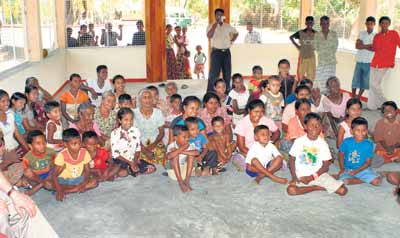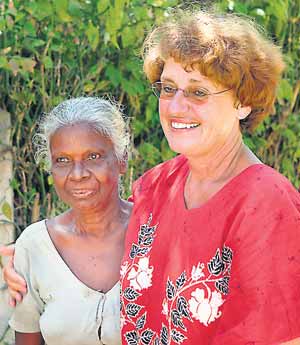
Sri Lankan “untouchables” look for overseas jobsKurunegala --The people of Kanatholuwa are looking for jobs and income generating methods to climb out of poverty but centuries of tradition and beliefs are standing in the way.
Generating jobs for the people of Kanatholuwa, a hamlet in the interior of the Kurunegala district, has been more difficult than in an ordinary village. This is a Rodiya village. The Rodiya people were once considered the Sri Lankan equivalent of the untouchables of India. Traditionally these communities lived by begging because this was the occupation of the Rodiya caste during the time of the kings. But now, in the era of free education and an open economy, the people of Kanatholuwa too, want to benefit from new opportunities and move away from their traditional occupation of begging. “Now-a-days most of our young people are educated. So they don’t want to do the old things,” says R Neelawathi from the recently formed Kanatholuwa Women’s Association. The villagers, especially the younger generations, carefully avoid mention of the word Rodiya or begging. But access to education is still very limited. The village school is only equipped to the fifth standard and for higher education children must go in search of other schools. “About 10 families in the village have sent someone abroad. These are mostly married women but it is not easy to go abroad like that,” says R. Sujeewa. Almost the entire village claim to be Samurdhi beneficiaries but the public expenditure is not yielding adequate results. “We get Samurdhi but it is only about Rs 250 for a month. This is not even enough to buy food let alone other things,” says M. Nilantha.
“There are only three wells for the village and only two are good for drinking. Often in the dry season the wells dry up and we have to find other sources of water,” says M. Chamali. Time to change “People don’t like to give them jobs. Even when they make things to sell people don’t like to buy from them. When the children go to schools outside Kanatholuwa, parents don’t like their children mixing with these children. Until recently there was not even a Buddhist monk at the temple in the village,” says Lakshman Mahanama, General Manager of the Universal Association for Peace and Love – a non profit company involved in social service. Other settlements, similar to Kanatholuwa, are said to be scattered around the island. Shifting such communities away from begging, point out social workers, would reduce the burden on society and the public budget. But despite the enthusiasm by villagers for new types of work, social workers say the transition is easier said than done. “This village has previously got assistance under the Sarvodaya movement, from President R. Premadasa and even from Prime Minister S. W. R. D. Bandaranaike but these people have now got used to begging. So it is difficult to shift them into other types of work,” says Mahanama. The Universal Association says it is looking at long term involvement in the village to change lifestyles and develop new income modes over a number of years. “First we will improve their nutrition. A medical clinic held in the village found that many children are malnourished. We are also trying to find out what they can do. Later we will provide training in sewing, carpentry or whatever is suitable. One problem has been that they could not sell what they produce. So we are considering buying from them and selling in other markets,” says Ursula Beier, the director of the Universal Association for Peace and Love. The Association has already built a community centre for the village and is building a well to alleviate the village water shortage. |
| || Front
Page | News
| Editorial
| Columns
| Sports
| Plus
| Financial
Times | International
| Mirror
| TV
Times | Funday Times | MediScene || |
| |
Copyright
2007 Wijeya
Newspapers Ltd.Colombo. Sri Lanka. |

